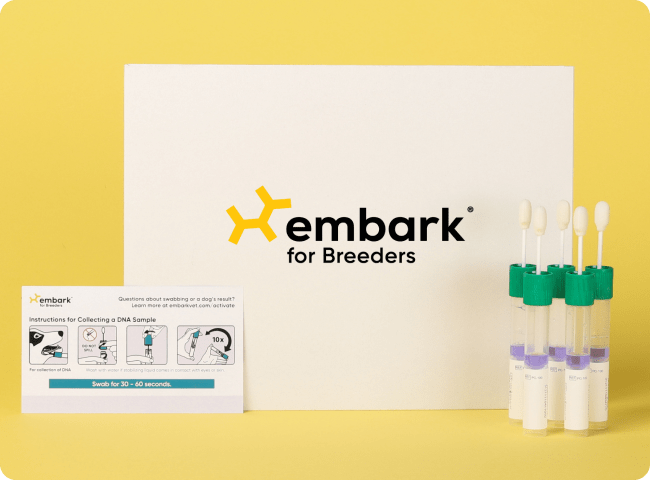What is Degenerative Myelopathy (DM)?
A disease of mature dogs, Degenerative Myelopathy(DM) is a progressive, degenerative disorder of the spinal cord that causes muscle wasting and gait abnormalities. Affected dogs do not usually show signs until they are at least 8 years old when the nerves that supply the hind limbs begin degenerating. At first, an affected dog may scuff the tops of their hind paws or walk with a hesitant, exaggerated gait. In its advanced stages, DM can lead to profound weakness and gait abnormalities in all four limbs.
Embark tests for the SOD1A variant associated with Degenerative Myelopathy. This variant is reported to have incomplete penetrance, which means not all dogs with two copies of the variant will go on to develop clinical signs. Other genetic and environmental factors also likely contribute to the development of DM. While we test for the SOD1A variant, we do not test for the SOD1B (Bernese Mountain Dog type) variant at this time. Embark’s Degenerative Myelopathy genotype results apply only to SOD1A.
Because the SOD1A variant is incompletely penetrant, many dogs testing at-risk from the variant will live long lives and never develop the disease. It’s also important to note that this variant is only known to increase the risk of DM in certain breeds, most notably in German Shepherd Dogs, Boxers, and Pembroke Welsh Corgis. German Shepherd Dogs and Boxers. The genetic variant itself has been found in many breeds, but DM has only been definitively diagnosed in a handful of breeds. Other breeds where this variant occurs but is not associated with DM risk likely have unknown genetic factors protecting them from this disease.
My dog has two copies of this variant and is listed as having an increased risk for DM; now what?
If your dog is considered at-risk, this should open the door to a discussion with your veterinarian. As DM is a late-onset condition and genetic risk does not mean clinical signs are guaranteed, drastic measures should not be an immediate concern. However, there are supplements and lifestyle modifications that may be of benefit to your dog.
My dog has two copies of this variant but is not listed as having increased risk for DM; now what?
For some breeds, research indicates that the SOD1A variant is not likely to increase the risk that a dog will develop DM. This variant is found in many breeds of dogs, but researchers have only observed clinical signs and histopathological (microscopic) changes with this variant in a small number of breeds.
When determining whether or not a variant is expected to have a clinical impact for a breed, we have taken into account research either published, internal, or otherwise presented by a subject matter authority as our primary criteria. For breeds where clinical risk from this variant is not likely, this genetic result should not be the primary factor in breeding decisions.
To determine if the variant in SOD1A is expected to have a clinical impact on your breed, search for your breed and look for the “Embark Recommended” logo next to this condition. The OFA will register DM results for any breed, so an OFA icon only indicates that it can be registered with the OFA and does not confer an impact on the breed.
What does it mean if my dog is a carrier?
As DM has an autosomal recessive mode of inheritance, dogs with one copy of the variant would be termed “carriers” and not be expected to be at increased clinical risk. However, in breeds where the SOD1A variant is associated with DM risk, carriers should not be bred to other carriers (or at-risk dogs) as this will lead to the production of at-risk puppies. For all other breeds, while it is still important to track the incidence of the variant and clinical disease within lines to inform future research, it is not recommended that this variant be used as the primary factor in breeding decisions at this time.
Learn more about how to apply genetic health results in the context of breed allele frequency by watching this educational video by Embark Chief Science Officer Dr. Adam Boyko.
We are interested to learn about the clinical impact of the SOD1A variant in more breeds. If you know of dogs that have been definitively diagnosed with DM (via histopathology) and have tested as having one or two copies of the SOD1A variant, please reach out to us at research@embarkvet.com. In addition, please fill out the Annual Health Survey on your Embark-tested dogs. Your responses will help us help all dogs.
Additional Resources and Publications on DM




